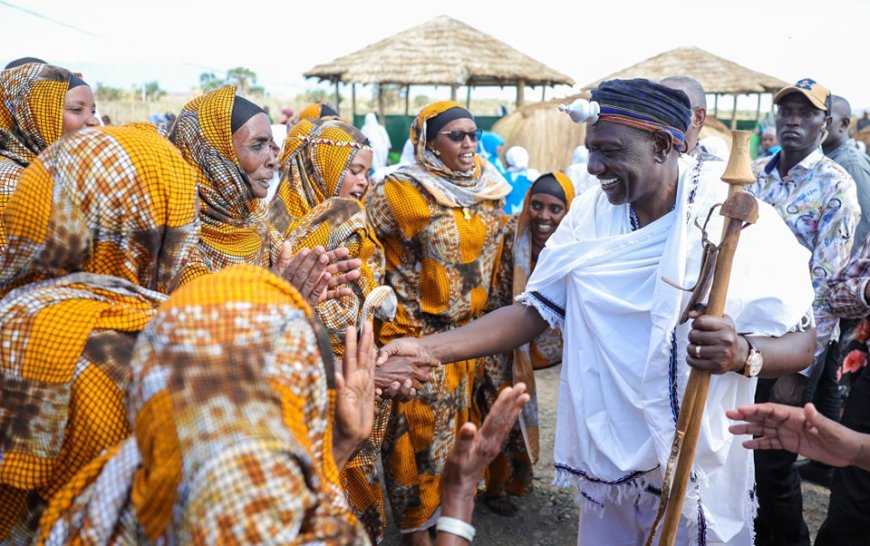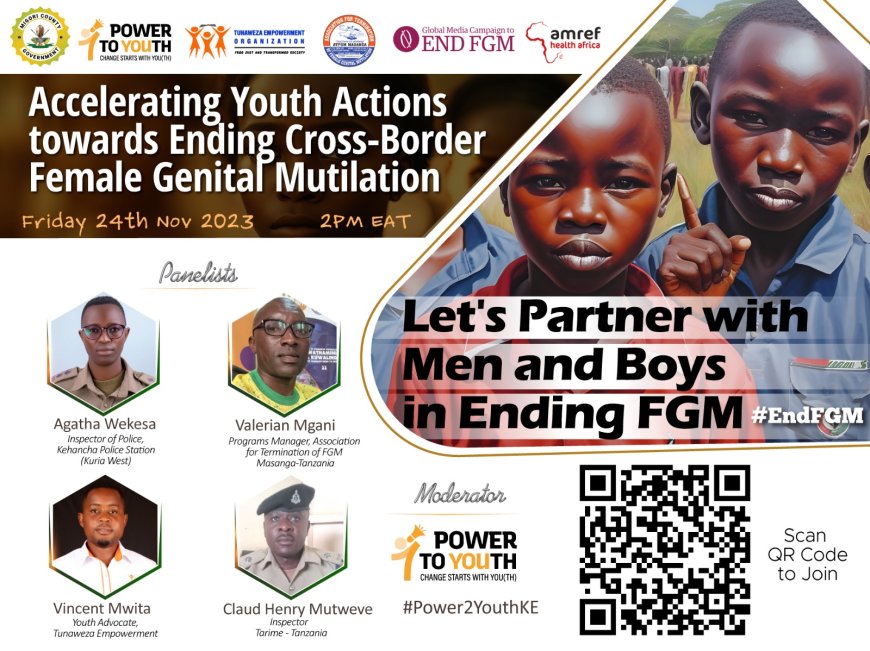Youth, stakeholder voices against cross-border FGM in Migori county

By Peter Ochieng
Cross-border Female Genital Mutilation (FGM) is still widespread along the Kenya – Tanzania border, even as various stakeholders step up measures to achieving zero border FGM by 2030.
According to the Kenya Demographic and Health Survey (KDHS) data for 2022, the prevalence of FGM is 15 percent in Kenya. This means 15 percent of girls and women aged 15 to 49 have been circumcised.
In 2014, the prevalence was 21 percent, and in 1998 it was 38 percent. The report states that in Migori county, 94.5 percent of women have heard about FGM, against 99.4 percent of men who have heard about the vice.
Kenya, like other nations around the world is currently marking the 16 Days of Activism against Gender-Based Violence, which kicks off every 25th November, the International Day for the Elimination of Violence against Women, and runs until 10 December, the Human Rights Day.
The campaign was started by activists at the inauguration of the Women’s Global Leadership Institute in 1991. It is used as an organizing strategy by individuals and organizations around the world, to call for the prevention and elimination of violence against women and girls.
Every year, the campaign focuses on a specific theme and this year’s is “Unite! Invest to prevent violence against women and girls.”
Speaking during an X (formerly Twitter) Space organised by Amref Health Africa on accelerating youth and stakeholders’ actions in ending cross-border FGM, Charles Olwamba, a project officer for Amref Health Africa in Kenya said decisions on the vice are made by cultural elders.
The session was held on 24th November, 2023, a day before start of the 16 Days of Activism against Gender-Based Violence. Olwamba said there is an urgent need for power shift in decision making, in a bid to save girls from the cut.
“Clan elders still have a lot of power. Girls need to get empowered to make decisions. Let us empower girls and engage community members so that they change their perception,” he said.
The vice is still rife in some communities in Kenya and Tanzania, such as Kuria which are found on both sides of the border. Besides culture, Charles said other factors such as trade which makes people to come interact almost a daily basis, helps to fuel FGM within Kenya and Tanzania.
“Beyond the traditions, there are also day to day activities across the border which helps fuel FGM because of people coming in contact and sharing information,” he added.
Power to Youth project in Kenya, seeks to empower young people to break down political polarization and forge lasting relationships with other change-makers, in ending harmful practices. During the session, it was noted that major decisions on FGM are made in Tanzania, given the fact that about three quarters of the Kuria population reside there.
“Most of the decisions are coming from cultural elders in Tanzania. Those in Kenya are getting instructions from Tanzania making it difficult to fight FGM on both fronts,” said Vincent Mwita, a youth advocate at Tunaweza Empowerment in Migori County.
He said a cross border FGM taskforce is in place, bringing together stakeholders from both Kenya and Tanzania, who work round the clock to achieving zero cross border FGM by 2030.

On her part, Jane Wekesa, an Inspector of Police at Kehancha Police Station in county, said the Kuria community in Kenya and Tanzania is joined at the hip by culture, warning against embracing negative cultural practices such as FGM.
“We can have an alternative rite of passage. Through sensitization, let us tell our girls that it is good to be different than to be stupid. They say that if I am not cut, I will not get married. Who said marriage completes a woman.
She said numerous anti-FGM legal frameworks are already in place, including the Maputo Protocol which guarantees extensive rights to African women and girls, and includes progressive provisions on: Harmful traditional practices like child marriage and female genital mutilation (FGM), reproductive health and rights, roles in political processes and economic empowerment. Kenya and Tanzania are party to the Maputo Protocol.
In Kenya, frameworks put in place to fight FGM include the penal code which is also available in Tanzania, prohibition of female genital mutilation act, 2011, children’s act, 2001 amended in 2022, protection against domestic violence, counter-trafficking act and the sexual offences act.
Speaking during the Marsabit Lake Turkana Cultural Festival, in Marsabit county over the weekend, president William Ruto said celebrating our culture amplifies our diversity and strengthens of our nation. He however urged communities to discard retrogressive cultures such as FGM.
“Communities should discard regressive cultural practices that hinder social and economic progress. Female Genital Mutilation, early child marriages, cattle rustling and ethnic-related conflicts are out-of-date and impede societal development. It is time we embraced progressive and diverse traditions that elevate our well-being."
What's Your Reaction?




































































































































































































































































































